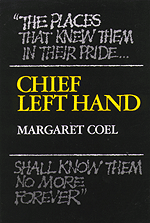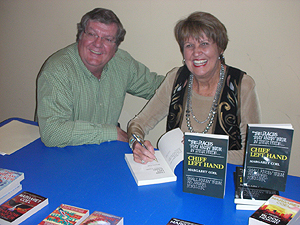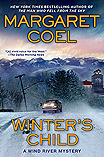 |
 Chief Left Hand
Chief Left Hand"The places that knew them in their pride shall know them no more forever." —E.N.H. Patterson, journalist, traveler (1859) Chief Left Hand is a biography of one of the leaders of the Plains Indians in the mid-1800s, a man who was fluent in English and skilled in diplomacy. It is the story of his struggle to maintain peace between the white people settling in the plains and the Plains Indians. It is also the story of the Arapahos when they lived on the plains of Colorado in the "old time," and of the events that led to the Sand Creek Massacre and the removal of the people to reservations. Published by the University of Oklahoma Press as part of the Civilization of the American Indian Series. Read an excerpt Discussion group topics 
Praise "Left Hand has been eclipsed in history by the great warrior chiefs of the Plains tribes. He was a man of peace, noted for his fluency in English, who realized from early contacts that the whites had come to stay. He was respected by frontier settlers of good will, avoided or ignored by villains intent on extermination of the Indians. Margaret Coel, using primary sources, tells the story of Left Hand and his tribe through the turbulent years of the Colorado Gold Strike to the tragedy at Sand Creek. She unravels the mystery of Left Hand at the massacre (mortally wounded, he escaped the field and died a few days later) and a later appearance of a man with the same name (a different, younger man). Coel also traces the careers of the notorious Col. Chivington and Gov. Evans; she documents the events that led to Sand Creek and reports on the subsequent investigation. It's a chilling, gripping story." —Publisher's Weekly "This is a beautiful book. It tells its story in a readable way, based on thorough scholarship and intimate acquaintance with the scenes described." —The Journal of American History "The reader...gains a generally solid and critical analysis of the career of an important Indian leader during times of great stress. Left Hand's pragmatism and perception of the inevitability of the white invasion are important themes in Indian-white relations, and the author has done well to integrate such themes into her narrative. Her engaging style will appeal to general readers as well as undergraduates interested in tribal dispossession." —Choice "The death of Left Hand, of wounds suffered at Sand Creek on November 29, 1864, confirmed the verdict of the falling stars: the Arapaho world was in disarray, and the syllables of their sorrow would be heard until their placement on reservations in Oklahoma and Wyoming. Margaret Coel is sensitive to these voices, and her book gives testimony to the efforts of the numerous Indian leaders who attempted to create peaceful ties between their people and the invaders." —Western American Literature "Thoroughly readable. Coel's work should be in most libraries, as testimony to one man's courage and a reminder of this nation's treatment of Native Americans." —Library Journal "An overwhelming sense of tragedy is revealed in Chief Left Hand: Southern Arapaho by Margaret Coel. Painstaking research helps create events long forgotten or suppressed. Chief Left Hand, who sought an agreement with whites that would restore peace and let his people survive, was mortally wounded in 1864 in the horrifying Sand Creek Massacre. It is portrayed as a moment of shame in American history. These sad, haunting words open Chief Left Hand: '...the places that knew them in their pride shall know them no more forever.' Read on, if you want to know American history." —The Los Angeles Times "Author Margaret Coel methodically presents her research with all of the talent of a fine novelist. The result is a fine and important book which sheds a great deal of light on the life and death of a man who was a linguist, diplomat, and chief of the Southern Arapahos in the mid-1800s." —The Fresno Bee Awards Chief Left Hand: Southern Arapaho received the Best Non-Fiction Book Award from the National Association of Press Women in 1982. In 2001, Chief Left Hand: Southern Arapaho was named one of the best 100 books on Colorado history by the Colorado Historical Society. The Denver Post has called Chief Left Hand "a classic." Clay Evans, columnist for The Boulder Camera wrote, "Recently I heard a most remarkable story... The mayor of Rochester, N.Y. wanted to promote a shared literary experience among his city's residents, so he put together a plan to have as many people as possible read Ernest J. Gaines' 1997 novel, 'A Lesson Before Dying,'...and talk about the issues raised by the book. What a brilliant idea. Might work here, too. Everyone could read, say, local writer Margaret Coel's excellent biography of Chief Niwot (Left Hand)...and learn about a past most of us know too little about. What do you say, Mayor Toor?" Chief Left Hand: Southern Arapaho is available from your favorite bookstore or from the University of Oklahoma Press, 1-800-627-7377. ISBN: 0-8061-2030-4. $19.95. |
|
|
|
